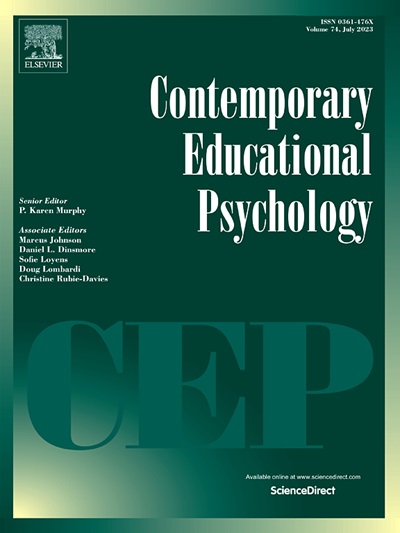Microdynamics of discussions that support the growth of causal reasoning
IF 3.8
1区 心理学
Q1 PSYCHOLOGY, EDUCATIONAL
引用次数: 0
Abstract
This study aims to understand the construction of multilink causal reasoning chains during collaborative discussions in elementary school classrooms. The construction of reasoning chains was investigated in 24 collaborative discussions involving 160 underserved fifth-grade children. The effects of moment-by-moment situational influences on seven causal chain models were tracked in the discussions. A temporal analysis of chain production indicated that the construction of causal chains accelerated over the course of the discussions. The turn-by-turn analysis of chain construction revealed that once a causal chain was initiated, it was likely to continue for at least three speaking turns. Agreement among group members and support from leaders and socially centered students extended the chain of reasoning. However, refutation and disagreement stopped the chain because the group had to resolve disputed ideas in order to develop a shared understanding. Students’ redirection of the topic served as a resetting mechanism for the chaining process. Once the topic was reset by a student, it was more likely for the current speaker to start a causal chain. Overall, the microgenetic analysis of the moment-by-moment exchanges within groups of children provides a more complete and precise picture of the process from which an important new intellectual competency emerges.
支持因果推理发展的讨论的微观动力学
本研究旨在了解小学课堂合作讨论中多环节因果推理链的建构。对160名服务不足的五年级儿童进行了24次合作讨论,研究了推理链的构建。在讨论中追踪了瞬时情境影响对七个因果链模型的影响。对连锁生产的时间分析表明,在讨论过程中,因果链的构建加速了。链式结构的回合分析表明,一旦因果链被启动,它很可能会持续至少三个说话回合。小组成员之间的一致意见以及领导和以社会为中心的学生的支持扩展了推理链。然而,反驳和分歧阻止了这条链,因为团队必须解决有争议的想法,以形成共同的理解。学生对话题的重定向是链接过程的重置机制。一旦一个学生重新设定了话题,现在的演讲者就更有可能启动一个因果链。总的来说,对儿童群体中每时每刻的交流进行的微遗传学分析,为一种重要的新智力能力产生的过程提供了一幅更完整、更精确的图景。
本文章由计算机程序翻译,如有差异,请以英文原文为准。
求助全文
约1分钟内获得全文
求助全文
来源期刊

Contemporary Educational Psychology
PSYCHOLOGY, EDUCATIONAL-
CiteScore
16.50
自引率
3.90%
发文量
74
期刊介绍:
Contemporary Educational Psychology is a scholarly journal that publishes empirical research from various parts of the world. The research aims to substantially advance, extend, or re-envision the ongoing discourse in educational psychology research and practice. To be considered for publication, manuscripts must be well-grounded in a comprehensive theoretical and empirical framework. This framework should raise critical and timely questions that educational psychology currently faces. Additionally, the questions asked should be closely related to the chosen methodological approach, and the authors should provide actionable implications for education research and practice. The journal seeks to publish manuscripts that offer cutting-edge theoretical and methodological perspectives on critical and timely education questions.
The journal is abstracted and indexed in various databases, including Contents Pages in Education, Australian Educational Index, Current Contents, EBSCOhost, Education Index, ERA, PsycINFO, Sociology of Education Abstracts, PubMed/Medline, BIOSIS Previews, and others.
 求助内容:
求助内容: 应助结果提醒方式:
应助结果提醒方式:


